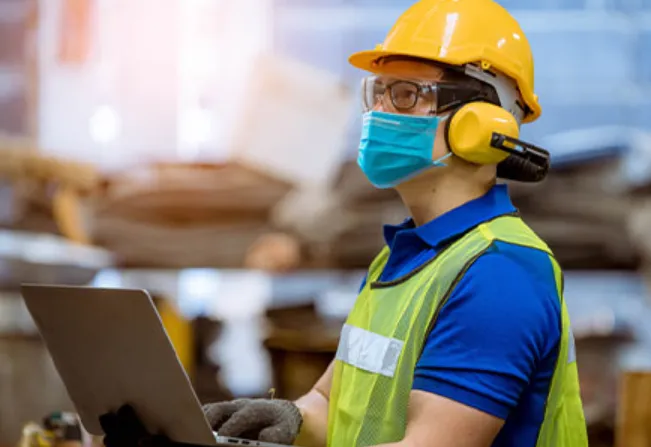In the Australian business world, maintaining health and safety protocols is essential to safeguarding employee wellbeing. Within the construction, manufacturing, and mining sectors, there is still occupational health exposure to hazardous chemicals like noise, dust, and fumes. This explains why businesses in Sydney and Melbourne are employing occupational hygienists to help mitigate these risks. Occupational hygienists have an essential function within a company as they identify, assess, and control workplace health hazards. In this blog post today we will discuss Australia’s high-risk industries and explore how Sydney and Melbourne companies can benefit from their expertise.
1. The Expanding Demand for Occupational Hygiene in Australia’s High Risk Industries
Asbestos diseases can be foundationally attributed to the lack of exposure management systems coupled with physically demanding occupations such as construction while also expanding into the healthcare industry along with mining too faced with these inefficient systems alongside other chemical handling practices. Manufacturing also suffers greatly from overexposure of excessive noise due to heavy machinery operation especially if combined with deficient health supervision programs leading to permanent illnesses both on an individual level alongside crippling financial losses for businesses overall.
Analyzing these risks and suggesting actions to prevent harm are part of an occupational hygienist’s functions. In Sydney and Melbourne, industries must comply with the Work Health and Safety WHS regulations which are legally binding policies dealing with business health hazard considerations. Australian businesses strive to engage occupational hygienists not only to enhance compliance but also to protect employee health in the long run.
2. The Scope of An Occupational Hygienist’s Work in Sydney And Melbourne
Specialists trained for diagnosing and correcting workplace challenges, at least within Sydney and Melbourne, as well as other major cities, are known as occupational hygienists. This group encompasses a multitude of professionals dealing with safety issues in workplaces in various capacities which covers crucial aspects needed for healthy employer-employee relationships. Occupational hygienists apply scientific methods to analyze work situations like air quality, exposure to harmful chemicals, noise levels, ergonomic structures of the workstation among others. Their professional activities aid in management and treatment of potentialhealth problems such as chronic respiratory illnesses, noise induced hearing loss snd soft tissue injuries like tendonitis that develop over time.
In Sydney and Melbourne, businesses actively seek occupational hygienists to assist them with compliance to local and national health regulations. These professionals perform exposure assessments, monitor environmental conditions, evaluate the workplace for best practices in minimizing exposure, and provide training. Additionally, they may work on developing and implementing health surveillance programs which assess the health of employees longitudinally; this ensures early detection and intervention for symptoms of ill-health.
3. Bridging the Gap Between Health, Safety, and Productivity
With effective occupational hygiene programs in place, not only is employee health protected but productivity within the organization improves at the same time. Health problems that stem from toxic exposure or physical strain typically lead to increased absenteeism alongside a dip in performance and an increase in healthcare costs. By hiring occupational hygienists in Sydney and Melbourne, employers are able not only achieve these objectives but also improve workplace health.
Occupational hygienists aid employers in complying with WHS legislative requirements which helps eliminate risks of legal action as well as financial penalties associated with non-compliance. Occupational hygienists positively influence workplace safety policies through their participation in hazard identification and control recommendations which reduces injury incidence along chronic illnesses. Consequently, companies experience reduced insurance costs, lower claims for workers’ compensation benefits, as well as diminished complaints from employees regarding poor working conditions—substantial improvements in employee morale instead.
4. PhD Opsteps: Proactive Hazard Evaluations and Risk Control Through the Eyes of An Occupational Hygienist
Identifying hazards in advance, long before it escalades to an issue is one of an occupational hygienists best skills. To aid businesses in both Sydney and Melbourne, occupational hygienists melbourne are employed to undertake regular health and safety risk assessments. This also helps eliminate concerns that are prone to escalate over time.
For instance, Sydney construction businesses might employ occupational hygienists for air quality monitoring during the peak construction season in order to check for dust pollution as well as other airborne contaminants. In employees protective clothes engineering from Melbourne, they often monitor chemical emission levels (toxic breathing fumes) which if unchecked could pose great inhale risk long term to workers’ lungs. Such actions if unchecked can result not only in chronic ill issues among employees but also fatalities.
5. Effects on The Environment As A Result of Occupational Hygiene LOSING FOCUS ON THE WORKFORCE
Apart from focusing on employees’ wellness at the workplace, occupational hygiene professionals take measures aimed at reducing undue stress placed on the environment by the workforce across different industries – mining, construction and manufacturing which do not provide proper management systems at work place deal with hazardous waste contamination on an environmental scale that can destroying our nature enormously along with untold damage over many years down onto us humans physically mentally because modern civilization does make much difference it buries its head in sand pretending green movements would resolve issues having no plan docile approach easy fixes losing sight of real changes needed hundreds earth pollution remove smiling cutting sides cars living naive dreams harder with security removing all this pollution not solving living zone permanent blocker life waste hiding
Sydney and Melbourne occupational hygienists are critical to evaluating these environmental risks. They assist businesses in complying with Environmental Protection Laws which include waste disposal, air emissions, and water pollution while also reducing the industrial ecological footprint during business operations. Occupational hygienists’ efforts lead to improved employee health and bolster environmentally sustainable organizational operations.
6. The Role of Occupational Hygienists in Fostering Workplace Safety
Cultivating a constructive workplace culture enhances risk management frameworks that promote the health and wellbeing of employees. In Australia, occupational hygienists foster workplace culture by implementing safety protocols alongside training programs and hazard awareness initiatives tailored for frontline staff. Moreover, they engage organizational leadership together with the workers to design appropriate health, safety, environment (HSE), and corporate social responsibility (CSR) governance frameworks.
Businesses in Sydney and Melbourne that actively prioritize their occupational hygiene program demonstrate care for their employees which boosts retention rates along with job satisfaction levels accompanied with better company image. Employees who perceive safety at work tend to be more engaged and productive leading to significant gains for both the workers as well as the organization overall.
7. Occupational Hygiene In Sydney And Melbourne: A Look Into The Future
The future demand for health hygiene professionals in Melbourne and Sydney is predicted to increase along with shifts within industries and new health concerns cropping up. Due to the emphasis placed on environmental sustainability, mental health, and the wellness of employees, occupational hygienists are &will be more instrumental than ever before in workplaces. As businesses strive to meet compliance obligations regarding new technologies alongside drastically emerging changes coming to a myriad of workplace practices, their support eases navigating through complexities and emerging new challenges.
Australia still has room for innovation, collaboration as on-going developmental best practices in occupational hygiene. With ongoing changes across industries and regulations – there will still constant practice update which require occupational hygienists’ interventions.”
Conclusion
In Sydney and Melbourne, occupational hygienists play a critical part in protecting the health of employees, maintaining compliance with relevant laws, and promoting safety culture. Occupational hygienists do not only manage risks; they assist companies in hazard identification, risk control, and sustainability for long-term continual improvement. As Australian industries adapt to new challenges and opportunities, occupational hygienists will be at the forefront in advancing healthier workplaces as well as enhancing environmental responsibility. Safeguarding workplace health improves profit margins while enhancing reputation during fierce competition and increasing regulations on business operations.








